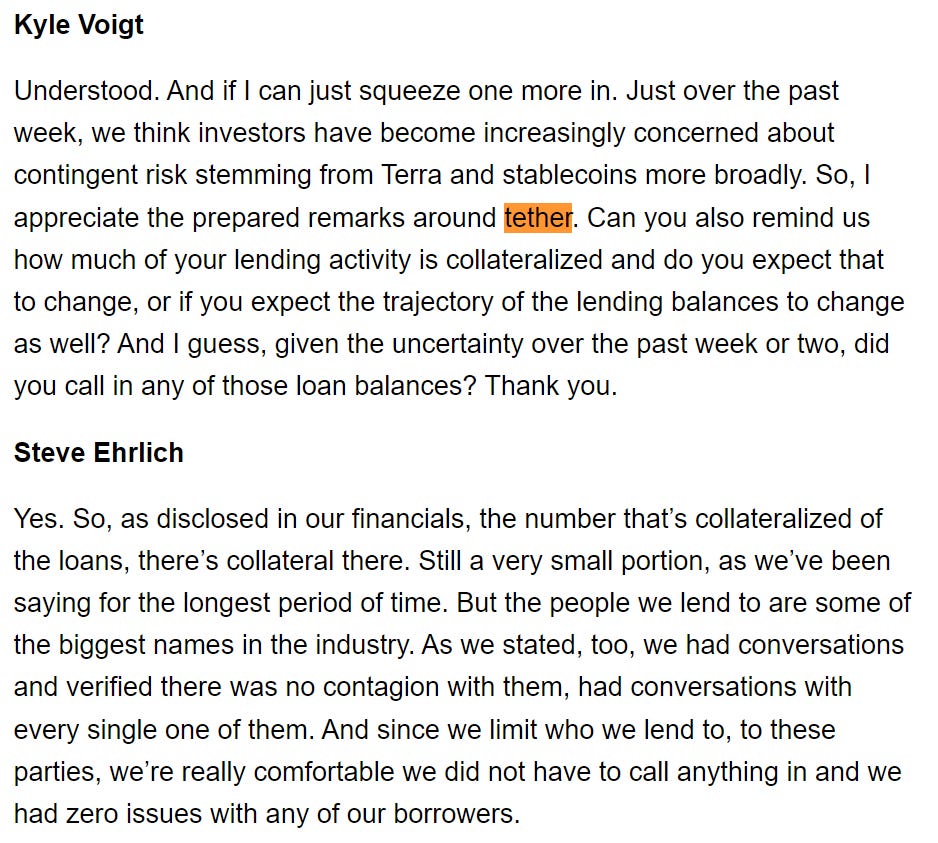Follow-up on Voyager Counterparty Risk
TLDR:
The “rewards” offered by Voyager on USDC are marketing spend, and as such could go away at any time.
I don’t perceive Voyager counterparty risk to be any greater than any other well capitalized, well-known digital asset platform, probably even less since Voyager is incorporated in the US, operates out of New York, and is publicly listed on the TSE.
Thanks to thoughtful questions from one of my readers I’ve spent some time doing some more due diligence on Voyager, the digital asset platform I recommended using in my last post to capture high “interest” rates offered on USDC.
With the ever-present caveat that I’m not a lawyer nor a financial advisor and nothing on this blog is legal nor financial advice, here’s what I’ve learned.
First, it’s accurate to label what I was calling “interest” as rewards. Indeed, this is the term Voyager uses on their app. What you’re earning is rewards, not interest, because it is being funded from Voyager’s marketing budget and not from any borrow-and-lend program. It is also not a guaranteed fixed rate for any period of time — Voyager is afforded opportunity to change the rewards offered on USDC balances whenever they please.
I suspect this distinction (rewards vs. interest) is at the core of why Voyager is allowed to continue offering the product while a similar, competing product from BlockFi - BlockFi Interest Account (BIA) received to a cease and desist order from the SEC last year and another similar, competing product offered by Coinbase (Coinbase Lend) was stopped by the SEC before launch. While these two products were shut down/stopped because they had a borrow-and-lending component and were determined to be unregistered securities per the Howey Test, Voyager’s USDC rewards program (as well as rewards on other crypto assets) continues unabated and CEO Steve Ehrlich has said repeatedly on earnings calls that Voyager has been working with regulators every step of the way, is in compliance with all applicable securities laws, and is comfortable with their determination that their offering is not a security.
Now, if regulators wake up one morning and suddenly disagree, I believe the worst-case immediate impact to customers would be the instant removal of the rewards program. I do not believe any forfeiture of previously accrued rewards would be in play. As mentioned in my previous post, this risk is mitigated by the instant liquidity available on USDC on Voyager, meaning you can trade for good ole USD and have the funds back in your checking account same-day, subject to platform daily withdrawal limits.
A second-order risk to Voyager customers could be a run on USDC on Voyager if the rewards were to vanish, i.e. everyone logging on at once and requesting to withdraw or sell their USDC. I’m actually not sure if this is a risk to Voyager customers or solely to Voyager, but regardless I don’t perceive this risk to be meaningful for the following reasons. One, if this happened it would be specific to Voyager and not to USDC system-wide. Remember USDC is redeemable for 1:1 with USD. Two, per the table below from Voyager’s last quarterly financial statements, USDC accounts for only 5% of crypto assets held by customers on Voyager, so it’s unlikely to me that they wouldn’t be able to honor a significant amount of withdrawals of the asset in a short amount of time.
Third, Voyager is currently rolling their Mastercard debit card out to 200,000 waitlisted customers. This debit card allows you spend USDC directly from your Voyager account everywhere Mastercard is accepted. The value-proposition is that you’re earning the juicy rewards on your USDC balance right up until swipe — so, instead of having your working capital sitting idle in a checking account, you’re always earning on it. To me this represents another reason for stickier customers to have USDC on Voyager, and a more diverse customer base makes a mass exodus of customer USDC assets from the platform less likely.
So, with the interest vs. rewards technicality cleared up, we can dive into the Tether counterparty risk question.
Voyager addresses counterparty risk directly and Tether indirectly in their last earnings call:
They don’t mention Tether by name, but later in the call an analyst does:
So, it seems like they have been asked and have actively addressed the Tether counterparty risk question. Additionally, per the table above, USDT is not listed in the top 15 assets held on Voyager and would at most represent <1% of assets held.
With that out of the way, I don't perceive there's any more counterparty risk with Voyager than with other well-known and well capitalized digital asset platforms, and probably less since they are incorporated in the US and also publicly traded so they have all the compliance, disclosures and oversight that comes with that.
Finally, the company just announced they raised $60 million in a private placement led by and participated in by some of the biggest investors in crypto (Alameda Research, Galaxy Digital, Three Arrows Capital). After the raise they now have US $175 million in cold hard cash.
Not that you should every rely on a large crypto hedge fund or anyone else for the confidence to invest in anything, but extra cash on the balance sheet is extra cash on the balance sheet.
If you decide to create an account with Voyager, you can use this link or my referral code 2E702D upon sign-up to receive $50 worth of bitcoin.
Disclosure: the author owns Voyager’s VGX token and USDC.
Disclaimer: nothing published in this newsletter is investment or financial advice. The author may be long or short any of the securities or assets discussed at any time before or after publishing.






